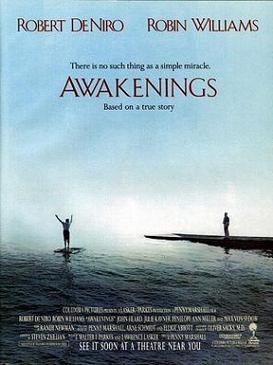Based on
a true story, Awakenings recounts the story of Dr Sayer, a researcher without a
clinical background who was suddenly entrusted with the care of patients in the
Garden Ward, a ward in which patients were nurtured in pretty much the same way
as plants- watered and fed. However in his perseverance, Dr Sayer tested a new
drug on his catatonic patients resulting in their awakening and the friendship
that forms, especially the friendship between Dr Sayer and Leonard.
How to Live: A Guide to Your Own Personal Awakening by Leonard Lowe
“My name is Leonard Lowe. I have been told that I have
been away for some time... I’m back...”
1. Take everything in stride and
Instead
of deciding if a glass is half full or half empty, why not just fill it up to
the brim? Even if you find yourself waking up from a catatonic state, in which
you were as “substantial as a ghost” for almost 30 years, carry on. The world
outside may be new and scary but this may only be your one shot to live again-
your one last chance.
2. Kindness is powerful
Let me break this down
for you. We are all people. Even if I do not have a voice, I have a mind of my
own, and I have feelings. Even if I am a patient in a mental ward without a
sense of agency, in which I cannot feed or clothe myself, treat me like a human
and not an item.
3. Fight for what you believe in
I believe that life is
precious and fleeting and should not be wasted. Life is not only about the
major life changing events, but it is also about every inconsequential little
bit of routines and actions; things that we often take for granted. The matter
of fact is this: That you are reading this means you are not blind and free to
drink in the world around you with your eyes. Enjoy walking... Not everyone can
do so. I also believe in my
friend who will find me a cure. Yes, I am suffering, but I believe it is not in
vain. I want a cure to be found and while it is a little humiliating, I would
rather have him video record my symptoms, just so he could
learn...learn...learn...
4. Love and sacrifice goes hand in hand
“If you love somebody, let them go. If they return,
they were always yours. If they don’t, they never were.”
Love is
one of the wonderful adventures of life, and it is easy to selfishly want it
for yourself. I met a beautiful woman named Paula and I wanted her affection
for as long as possible, but when my illness came back, I knew that it would
burden her and hinder her from her own happiness. Telling her that I would
never see her again was difficult but I would rather sacrifice my own happiness
for her sake.
Pro-tip:
What Leonard Taught Me
For
someone who was barely awake and considered almost dead by the people around him,
it is undeniable that his brief period of awakening had such an impact on the
people around him and to us, the audience. There was definitely a moment when I
myself thought, “Oh dear, there is so much that this man does not know of.
There is much to learn, of living in the modern world, of how to be in love”,
but I was proven wrong.
Most of
us are born with the sense of agency, which is the awareness to initiate,
execute and control one’s own action and through them, our experience of the
outside world (Haggard & Chambon, 2012). While an important part of what
makes us conscious beings, it is something that most of us readily take for
granted.
Personally,
I feel that I try to appreciate every aspect of my own life. I consider every
day to be a new adventure but after watching this movie, it made me wonder...Would
I still have the same positive disposition if I were in Leonard’s position?
Reference:
Haggard, P., & Chambon, V.
(2012). Sense of agency. Current Biology,
22(10), R390-R392. doi: http://dx.doi.org/10.1016/j.cub.2012.02.040












